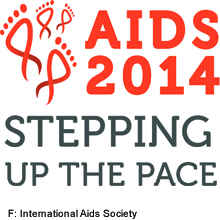The 20th International AIDS Conference in Melbourne, Australia, ends on 25 July 2014. In the "Melbourne Declaration", the organisers call for an end to discrimination and stigmatisation: anyone can sign the declaration to demonstrate against discriminatory and stigmatising practices and demand a fairer and more effective approach through concrete actions. Click here to go directly to the declaration.

The translation from English:
"All human beings are born free and equal in dignity and rights. They are endowed with reason and conscience and should treat one another in a spirit of brotherhood." (Article 1 of the Universal Declaration of Human Rights of 1948)
For the 20th World AIDS Conference 2014, we gather in Melbourne, the traditional gathering place of the Wurundjeri, Boonerwrung, Taungurong, Djajawurrung and the Wathaurung, who were originally and still are the custodians of this area and form the Kulin nation. We gather here to discuss the progress of the global response to HIV and its future direction.
We, the signatories and supporters of this declaration, reaffirm that equity is essential for an evidence-based, rights-based and gender-equitable approach to HIV, as well as for effective public health programmes.
To defeat HIV and achieve equal access to HIV prevention, treatment, care and support for all, no one should be criminalised or discriminated against on the basis of gender, age, race, ethnicity, disability, religious or spiritual beliefs, country of origin, national status, sexual orientation or gender identity, being a sex worker, prisoner or detainee, current or former illicit drug use, or HIV infection.
We reaffirm that all women, men, transgender and intersex adults and children are entitled to equal rights and equal access to information and services for HIV prevention, care and treatment. Promoting gender equality is crucial to addressing HIV in a way that truly meets the needs of those most affected. Similarly, people who offer or have offered sex for money or who use or have used illicit drugs are entitled to the same rights as everyone else, including equal treatment and confidentiality in accessing HIV care and treatment services.
We are all deeply concerned about the continued enforcement of discriminatory, stigmatising, criminalising and harmful laws that lead to policies and practices that increase HIV vulnerability. These laws, regulations and practices incite extreme violence against marginalised groups, reinforce stigma and undermine HIV programmes. They represent significant steps backwards for social justice, equality, human rights and access to care for people living with HIV and those most vulnerable to the virus.
More than 80 countries have unacceptable laws that criminalise people because of their sexual orientation. All people, including lesbian, gay, bisexual, transgender and intersex people, are entitled to the same rights. All people are born free and equal and are equal members of the human family.
When healthcare providers discriminate against people living with HIV or groups at risk of HIV or other health threats, they violate their ethical duty to care and treat people without prejudice.
For this reason, we call for immediate and united resistance to these discriminatory and stigmatising practices and demand a fairer and more effective approach from all stakeholders through the following actions:
- Governments must abolish repressive laws and stop policies that reinforce discriminatory and stigmatising practices and thus increase HIV vulnerability. At the same time, they must introduce laws that actively promote equal treatment.
- Decision-makers must not use international health conferences or congresses to promote discriminatory laws and practices that are detrimental to health and well-being.
- Organisations that promote intolerance and discrimination, including sexism, homophobia and transphobia, against individuals or groups should not receive funding for HIV programmes.
- All healthcare providers must demonstrate that they are implementing equity strategies in order to receive further funding for HIV programmes.
- Funding restrictions such as the anti-prostitution obligation [http://en.wikipedia.org/wiki/Anti-prostitution_pledge] and the ban on the purchase of needles and syringes must be lifted because they hinder efforts to curb HIV, sexually transmitted infections and hepatitis C among sex workers and drug users.
- All signatories to this declaration must stand up for inclusion, non-criminalisation, equal treatment and tolerance.
In conclusion, we reaffirm our unwavering commitment to justice, equal access for all to health care and treatment, and support for the inherent dignity and rights of all people. All people are entitled to the rights and protections granted in international frameworks.
We can only defeat AIDS if we overcome the barriers of criminalisation, stigmatisation and discrimination that continue to be the key drivers of the epidemic.
Link to the original page with the possibility to sign.









